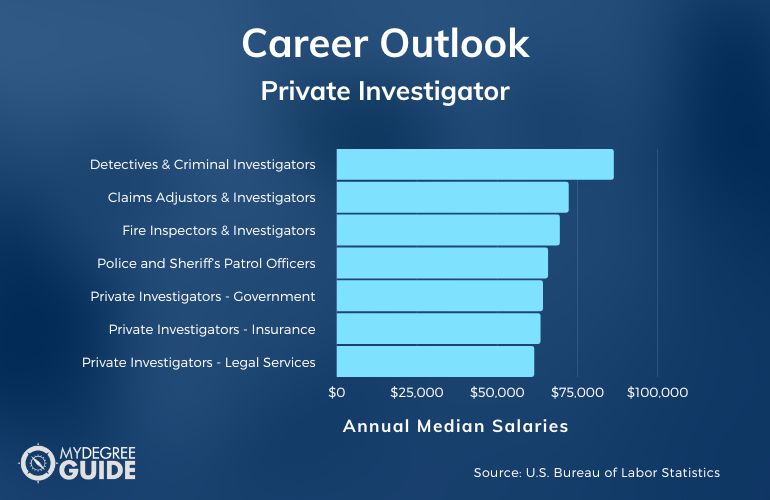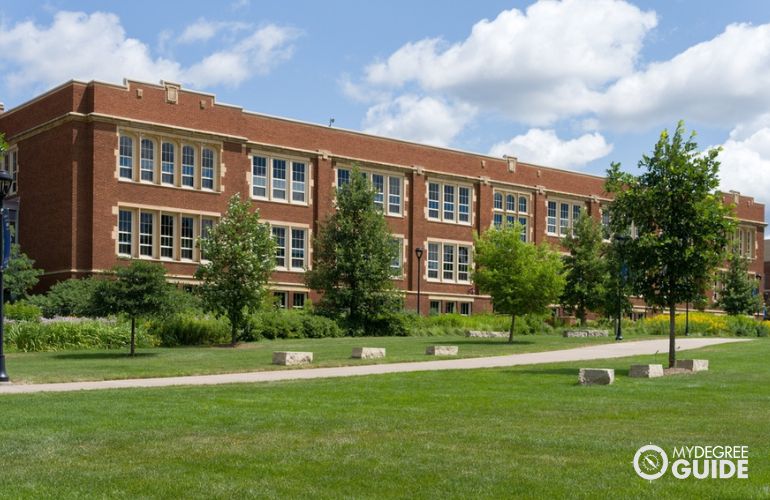Private investigator schools teach students how to conduct surveillance and gather evidence through legal means. These undergraduate certificate programs provide specialized training that allows students to strengthen vital skills like critical analysis, research, and sleuthing.

Coursework covers a variety of investigative tactics, such as interviewing witnesses and surveilling buildings for suspicious activity.
Editorial Listing ShortCode:
Graduates may use their private investigator training to secure positions with government agencies, law enforcement departments, and private agencies that provide investigative services for individual clients.
Universities Offering Online Certificates in Private Investigation Programs
Methodology: The following school list is in alphabetical order. To be included, a college or university must be regionally accredited and offer degree programs online or in a hybrid format.
Fox Valley Technical College
Fox Valley Technical College offers a Private Investigation Specialist Certification. The program requires 18 credits, which can be completed online or at the Appleton campus. Potential courses include Introduction to Forensic Science, Introduction to Private Investigations, Principles of Asset Protection, Writing Reports, and Criminal Procedures.
Fox Valley Technical College is accredited by the Higher Learning Commission.
Northeast Wisconsin Technical College
Northeast Wisconsin Technical College offers an online Professional Private Investigator Certificate. Courses may last 8 weeks or a full semester depending on part-time or full-time study. Credits earned in the program may transfer to an associate degree in justice and community advocacy.
Northeast Wisconsin Technical College is accredited by the Higher Learning Commission.
South College
South College offers a Certificate in Investigation and Security. This online program can potentially be completed in a 12 months of full-time study. Courses are designed to help emphasize collaboration and critical thinking. Those that earn this degree often work in security positions, retail loss prevention, asset protection, and bond enforcement.
South College is accredited by the Southern Association of Colleges and Schools Commission on Colleges.
St. Cloud State University
St. Cloud State University offers an accelerated 7 week Legal Investigation Certificate. The program usually requires approximately 8 hours per week for reading and writing assignments. The curriculum is designed to teach about civil and criminal investigations while offering opportunities to assist attorneys, private businesses, and government agencies.
St. Cloud State University is accredited by the Higher Learning Commission.
University of Washington
The University of Washington offers a Certificate in Private Investigation. Classes are held online in the evenings, and the full program typically takes about 8 months to finish. Potential courses include The Business of Private Investigation, Civil Investigation and the Law, and Criminal Investigation and the Law.
The University of Washington is accredited by the Northwest Commission on Colleges and Universities.
Online Private Investigator Schools

Private investigator colleges offer certificate or diploma programs for students who want to learn investigation techniques.
These programs cover approaches and methods that detectives and other professionals use to collect information and conduct in-depth research. Students can also get exposure to different specialties in the field, including computer forensics and insurance fraud.
Private investigators don’t have the same legal authority and powers as police officers. They must follow strict ethical and legal requirements, and certificate programs teach students about relevant laws and protocols.
The specific curriculum will vary by program, but topics covered by private investigator schooling typically include:
- Background investigation
- Counterintelligence
- Executive protection
- Firearm safety
- Handwriting analysis
- History of law enforcement
- Homeland security
- Insurance fraud investigation
- Interviewing techniques
- Skip tracing
- Surveillance photography
During your studies, you can develop critical thinking and problem-solving skills as you learn how to obtain evidence and detect fraud. You could also expand your interpersonal abilities by conducting interviews and writing reports. Plus, you may develop a sharper eye for detail as you study surveillance techniques.
In addition, some online certificate programs have optional internships or work experiences. These opportunities allow you to practice applying your skills to actual investigations. They can also provide valuable networking opportunities with current professionals. Graduates use their private investigator training to pursue a broad range of career paths in many industries.
Many current professionals join or start private investigative agencies. These businesses offer a variety of detective services, such as GPS tracking and searching for missing persons. The government also offers many career opportunities. For example, the Department of Homeland Security and the Office of the Inspector General may hire professionals with private investigator schooling.
Some graduates work as government fraud investigators, while others perform backgrounds for people applying for security clearances. Corporations also hire private investigators to find information about competitors and detect crimes. Graduates may also work as loss prevention specialists for large retailers or investigate fraud for insurance companies.
Private Investigator Careers & Salaries

Many industries need specialists who can find evidence of wrongdoing, piece together clues, and track down obscure information. As a result, a private investigator certificate could help you qualify for numerous careers.
Some graduates secure positions in the legal field with a law firm or court. You might help attorneys collect evidence for criminal cases, civil lawsuits, and child custody disputes. Additionally, you could find witnesses and search for information in public records.
Private investigators also frequently offer their investigative services to individual clients. For example, a family could hire you to search for their missing loved one if law enforcement hasn’t solved the case. You might also find evidence to aid a client with their divorce proceedings, custody disputes, and inheritance conflicts.
According to the Bureau of Labor Statistics, here are the median salaries of careers related to private investigation.
| Careers | Annual Median Salaries |
| Detectives and Criminal Investigators | $86,280 |
| Claims Adjustors, Examiners, and Investigators | $72,230 |
| Fire Inspectors and Investigators | $69,450 |
| Police and Sheriff’s Patrol Officers | $65,790 |
| Private Detectives and Investigators — Government | $64,210 |
| Private Detectives and Investigators — Finance and Insurance | $63,440 |
| Private Detectives and Investigators — Legal Services | $61,480 |
| Legal Secretaries and Administrative Assistants | $48,780 |
| Private Detectives and Investigators — Investigation and Security Services | $47,280 |
| Security Guards | $34,750 |
Other industries that hire private investigators include cybersecurity, finance, government, healthcare, insurance, law enforcement, and retail. Some of these career paths require additional education or experience.
For instance, auditors typically have a bachelor’s degree in accounting, while police officers may need to attend a police training academy. Private investigator classes can give you a strong foundation in collecting evidence and solving problems.
Private Investigator Certificate Curriculum & Courses

Schools for private investigator training have unique curricula, but they tend to cover the same fundamental skills and topics.
Common private investigation classes include:
- Competitive Intelligence and Corporate Espionage: You’ll explore legal approaches for gathering data on corporate competitors and learn how to set up a counterintelligence program to thwart corporate espionage.
- Courtroom Testimony: You’ll learn how to present evidence in a courtroom and navigate procedures like cross-examination.
- Ethics: This class introduces you to ethical and legal guidelines that private investigators must follow, such as the Fair Credit Reporting Act and the Gramm Leach Bliley Act.
- Executive Protection: This course teaches you how to provide specialized security to people needing personal bodyguards.
- Insurance Fraud Investigation: You’ll learn how to identify various types of insurance fraud, collect evidence, and write reports.
- Introduction to Private Investigation: You’ll gain a foundational understanding of different types of investigations, services offered by private investigators, and techniques to assess crime scenes.
- Law Enforcement History: You’ll analyze the evolution of law enforcement and private security in the United States.
- Legal Principles and Requirements: This class covers laws governing private investigators and explores legal processes for criminal and civil matters.
- Surveillance: You’ll study methods for performing different types of surveillance—including observation at night, in rural and urban environments, and on foot.
- Techniques for Obtaining Information: You’ll explore interviewing approaches and learn how to collect and manage data from various sources.
Additionally, you may have the opportunity to take electives on more specialized topics like white-collar crime and videography.
How to Become a Private Investigator

Becoming a private investigator involves more than earning a certificate. Requirements vary by state, but many professionals follow these steps:
- Learn about licensure requirements. Each state has specific requirements to obtain a private investigator license. Common criteria include completing a training course, attending continuing education classes, and not having a criminal record. It’s beneficial to research the requirements in your state to ensure you can get licensed.
- Complete a certificate. Earning a private investigator certificate or diploma allows you to develop foundational detective skills, such as surveilling people and interviewing witnesses.
- Gain work experience. Many states require aspiring private investigators to work for an agency for at least 2 years before applying for a license. Your employer may need to sponsor your license application.
- Pass a private investigator exam. In some states, you’ll be required to pass an exam assessing your knowledge of private investigation methods and professional standards. This test may cover subjects like civil liability, legal terminology, and surveillance.
- Apply for your license. Finally, you’ll complete an application packet for your private investigator license. You may be required to provide proof of education, fingerprints, and professional references.
Once you’ve acquired a license, you can typically start working as an independent private investigator.
Admissions Requirements

Admissions requirements vary among private investigator colleges, but certificate programs typically have fewer criteria than undergraduate degree programs.
These are a few of the most common requirements:
- High school diploma or GED
- Completed application form and application fee
- Official transcripts from high school and any postsecondary schools you’ve attended
- English language proficiency
Additionally, some programs require students to have 2 to 4 years of work experience in law enforcement, the military, or related areas.
Private Investigation Schools Accreditation

Schools for private investigator training can earn regional accreditation to demonstrate that they provide high-quality educational services. Accredited colleges and universities have passed an external accrediting organization’s lengthy and rigorous assessment to ensure their curricula and services meet professional standards.
Many institutions only recognize course credits from accredited institutions, so attending one of these programs can make it easier for you to transfer schools or pursue additional education later. In addition, students who attend accredited programs may have more opportunities for financial assistance from the federal government and other organizations.
Financial Aid and Scholarships

Earning an online certificate or diploma generally costs less than earning a degree because these programs are shorter and require fewer courses. Still, many students seek financial aid to help pay for their private investigator classes.
The federal government offers student loans, grants, and work-study programs for qualifying students. You can complete a Free Application for Federal Student Aid (FAFSA) to see if you’re eligible for these options. Also, many state governments provide grants or scholarships to qualifying students who enroll at an in-state college.
If you currently have a job, your company may provide tuition reimbursement for employees who want to continue their education. You can also research private scholarships for crime scene investigation, criminal justice, and related fields.
Finally, many private investigator colleges offer payment plans to help spread out the cost of a certificate over several months.
What Is a Private Investigator Certificate?

A private investigator certificate is an academic credential you can earn by completing a short undergraduate program. Private investigator colleges typically only require students to complete 3 to 10 courses, so they’re faster than most degree programs.
These programs cover foundational concepts and skills in the private investigation field. You may take courses on topics like civil law, crime scene investigation, insurance fraud, and legal requirements for private investigators. Additionally, you can learn various investigative tactics, such as performing background checks, surveilling houses, and tailing a subject.
What Skills Do You Learn in a Private Investigator Training Program?

You can develop a broad range of practical skills as you complete your private investigator certificate, such as:
- Attention to detail. You can strengthen your observation skills and learn to spot evidence.
- Communication. You could learn how to effectively communicate with clients, employers, and witnesses.
- Interviewing. You’ll likely study techniques for developing rapport with interview subjects and gathering information from them.
- Surveillance. You can learn how to observe people discreetly in a variety of environments.
These skills can help prepare you for a career as a private investigator, detective, and related occupations.
What Can You Do with a Private Investigators Training Certificate?

Graduates use their private investigator certificates to pursue a range of career opportunities. Many current professionals begin their careers by working for private investigator agencies. Some people later start their own firms after gaining several years of work experience.
A private investigator certificate also helps graduates qualify for government jobs. For example, some professionals investigate social insurance and tax fraud for the government, while others conduct background checks. Additionally, many graduates work for law firms. They can help attorneys gather evidence for civil and criminal cases. They may also testify about their findings in court.
How Long Does It Take to Get an Online Training for Private Investigators?

Private investigator colleges have different semester schedules and requirements. So, the length of certificate programs can vary, but most programs require students to complete between 2 to 8 courses.
If you enroll full-time, you may complete your certificate in less than 1 year. Some accelerated programs take only 1 month or 2 months to finish. Completing an internship may extend your schooling by a few months. Many online certificate programs allow students to attend part-time. This option can make it easier to juggle school with other responsibilities, but it might take longer to complete your training.
What Does a Private Investigator Do?

A private investigator gathers evidence for criminal, financial, legal, and private matters. They often work for individual clients or for employers like government agencies and insurance companies.
The daily responsibilities of private investigators vary depending on their specific roles and employers, but they typically use detective skills and investigative tactics to uncover information. For example, a private investigator may analyze financial records to catch an embezzler or conduct surveillance on people suspected of committing insurance fraud.
Private investigators also create written reports and presentations about their findings. They may share their evidence in a civil or criminal court to support their client’s case.
How Much Does a Private Investigator Make?

A private investigator’s salary depends on many factors, such as employer, geographic area, level of education, and relevant skills.
According to the Bureau of Labor Statistics, the median salary for private detectives and investigators is $52,120. Most make between $33,710 and $92,660 each year. Private investigators who work in the finance and insurance sector make a median of $63,440.
Additionally, detectives and criminal investigators who work for law enforcement agencies have a median salary of $86,280. The median salary for law enforcement workers overall is $61,690.
What’s the Difference Between a Private Investigator vs. Detective?
A private investigator and detective have similar skills, but these jobs have several significant differences.
| Private Investigators | Detectives |
|
|
Your academic goals and interests can help you choose between these career paths.
Is a Certificate in Private Investigation Training Worth It?

Yes, a certificate in private investigation training is worth it for many students. A certificate program allows you to study fundamental approaches and tactics used by private investigators and detectives.
You can learn how to collect and verify evidence, find missing people, and help clients solve problems. Private investigation classes also give you the opportunity to strengthen valuable skills. For example, you can improve your critical thinking, interpersonal, and investigative abilities. You’ll also explore practical techniques that you can use to gather information, like interviewing suspects and skip tracing.
The Bureau of Labor Statistics anticipates that the demand for private detectives and investigators will grow by 6% over the next ten years.
Getting Your Private Investigating Training Online

Whether you want to become the next Sherlock Holmes or want to investigate corporate crimes, a certificate in private investigator training can help you gain the necessary skills. This credential may also help prepare you for a state licensing exam.
Private investigator classes cover a wide range of topics, such as corporate espionage, homeland security, and legal requirements for professionals in the field. Completing a certificate could open the door to career opportunities in government, insurance, law, and other industries.
You can start your professional journey today by exploring accredited online schools for private investigator training.
